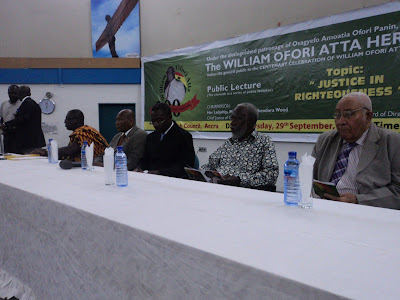
Some of the dignitaries at the lecture included Professor Stephen Adei (2nd right), former Rector GIMPA; Prof. EVO Dankwa (3rd right), the main speaker and Sam Okudzeto (4th right) who chaired the forum.
Posted on: www.dailyguideghana.com
By William Yaw Owusu
Saturday October 1, 2011.
Professor Emmanuel Victor Oware Dankwa, one of the best legal brains in the country has said those tasked to dispense justice must always strive to avoid the perception that they exist to serve only the well-off in society.
“The use of the application of the law that we have learnt, the oath of office that we have taken, the conscience that prick us to do what is right are the guides that brings justice in righteousness.” he said.
Professor Dankwa was speaking at 11th in a series of public lectures organized by the William Ofori Atta Heritage to mark the late statesman’s centenary celebration.
William Eugene Amoako Atta Ofori Atta aka Paa Willie (1910 - 1988) was one of the torch bearers (later called the Big Six in political parlance) in the struggle for independence for Ghana from the British.
Speaking on the topic: “Justice in righteousness”, Prof. Dankwa said “righteousness can help those who apply the law to enhance justice”.
Occasionally making references in the Holy Bible Prof. Dankwa said judges should speak up for those who cannot speak for themselves and judge fairly so that the underprivileged in society would have hope.
“Maintain justice in the courts. A judge who has taken bribe cannot give a fair and just decision. Righteousness should preclude a judge from subverting the law. The judicial oath that our judges take gives no room for bribes. If we all want righteousness in our courts then bribery must be avoided by our judges.”
He said the constitution can be stifled, strangled or subverted if there is no recourse to justice, adding “judges wanting to pursue justice must not consider family, party affiliations, personal advancement or fear of the consequences of the true Judgement.”
“Justice must be seen to emanate from the courts. Truth and justice must have the last word in the legal system.”
“Not inclining the ear in judging a matter is the fundamental principle of fairness in the traditional system of time immemorial.”
Prof. Dankwa said “30 per cent of our population is considered poor and a large portion of them live in the rural areas. It is expensive to access justice and it is a reason for the grant of legal aid under Article 294 of the constitution. Even though the legal aid scheme Act of 1997is supposed to serve the needy, regrettably, the comprehensive legal aid policy is yet to be developed.”
Community mediation centers have been set up and as at 2008 the centers had increased to 26 so therefore justice was getting closer to people in an inexpensive manner adding “it is hoped that it will be extended throughout the country so that justice will be closer to all.”
Turning to conditions at prisons and other detention centers, Prof. Dankwa said the conditions must be humane for there to be justice in righteousness.
“For 12 years Prof Dankwa I was the a leading member of the African Commission on Human and People’s Rights and served for parts of that period as Vice Chair, Chair and Special Rapporteur on Prisons and detention Centers in Africa on the commission and therefore I have an insight into the harsh conditions of prisons on the continent”.
“Harsh conditions in the prisons do not lead to justice for all. The Justice for all Programme being undertaken is a step in the right direction.”
He cautioned lawmakers not to make laws that would bring hardships to the people saying “Unjust legislation cannot make justice in righteousness. Parliamentarians must be sensitive to the laws that they pass. They must always consider righteousness in the laws that they pass.”
“Preventive Detention Act (PDA) introduced during the Nkrumah regimes was a notorious legislation but that even as one condemns the PDA righteousness should prevent us from engaging in terrorists acts.”
He condemned what has come to be known as instant justice in the country saying “due process must be followed in determining the guilt of those who are suspect of committing crimes. Instant injustice has no place in a democratic dispensation and justice in righteousness does not allow for this.”
Prof. Dankwa eulogized Paa Willie saying “his sense of humour none can match, not just the content but the manner of delivery. He believed in justice in righteousness and wished justice for all.”
No comments:
Post a Comment